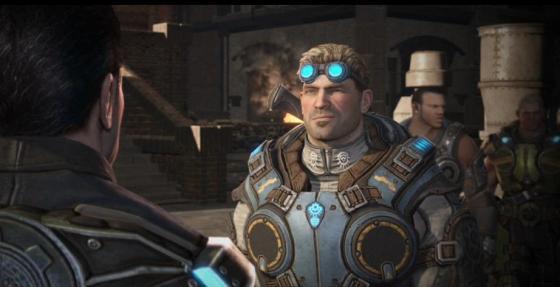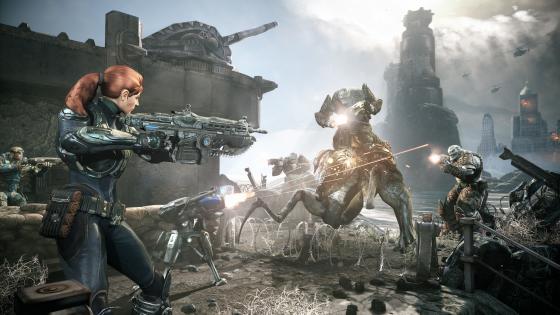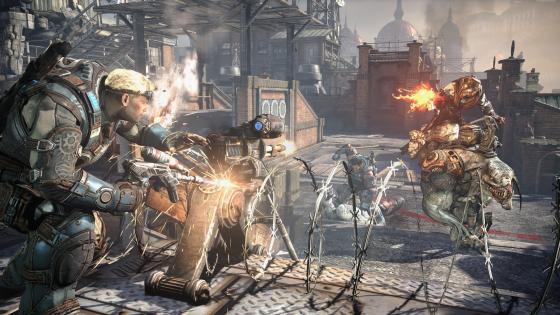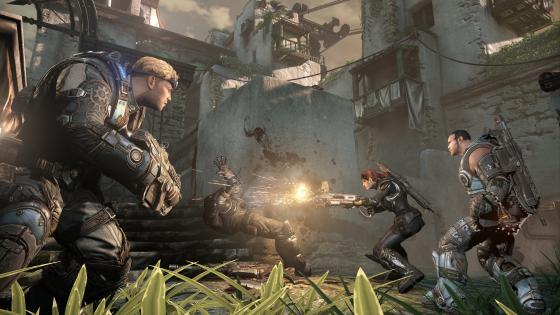Gears of War: Judgment Review
There is a lot riding on Gears of War: Judgment. It not only has to continue the legacy of a highly successful trilogy but provide something new and engaging enough to emerge from the shadow of its titanic predecessors. By shaking up the format and presentation of the campaign and multiplayer, fresh developers People Can Fly have certainly injected their own distinct style into the franchise.

Taking place shortly after Emergence Day (when the Locust attacked humanity) , Gears of War: Judgment follows Kilo Squad as they are tried before a court. Kilo Squad consists of series' veterans Damon Baird and Augustus Cole and two new COG soldiers: Garron Paduk and rookie Sofia Hendrick. The new additions could never compete with the absent Marcus or Dom and while initially they might grate on your nerves, as the story unfolds they become a core part of the team. Baird develops more than expected and manages to transcend the pigeonholing of "wise-cracking sidekick" from previous entries. Alternately Cole seems to undergo some character regression and is seldom as loud, brash or entertaining as Gears of War 2 which is something of a disappointment.
One of the main strengths of Gears of War: Judgment's campaign is how the story unfolds. Each act of the game is told as part of one of Kilo Squad's testimonies to a military court martial providing a different perspective on events, often interspersed with dialogue from the courtroom detailing events. It is a nice touch and keeps things fresh with each act having a definite and distinct feel to the action.
Fundamentally, little has been done to the core gameplay mechanics of the series. It is still a third-person, cover-based shooter and the format is tighter than ever. Indeed, the gameplay feels so refined now that it is difficult to imagine how it could be improved. Cover works fantastically, controls are fluid and responsive and the gunplay is meaty. Loading up the first few stages of the campaign feel like meeting up with an old friend and the sense of satisfaction as you clear an area of Locust is still as strong as it was in Gears of War.
However, while the principal gameplay remains unaltered there have been some key changes that ensure Gears of War: Judgment feels very different to its predecessors. One of the most significant is the "Smart Spawn System" which populates the areas you enter with different enemies each time. This certainly keeps things fresh, especially if you die and reload from a checkpoint. It means it is difficult to prepare for encounters with appropriate equipment forcing you to be adaptable and encouraging the use of different weapons and tactics.

The campaign portions themselves are also radically different with each overarching act broken down into much smaller chapters which typically last around ten minutes. Completing each of these mini-chapters awards you with stars (up to three per chapter) based on your performance with points added for executions, gibs, headshots and kills, and removed for being downed by the enemy. These stars generally unlock multiplayer content but also some extra story missions.
Tying into this new system are Declassified Missions, which are are optional modifiers that make the chapter more difficult but allow you to achieve stars more rapidly. These modifiers can vary from making the Locust harder, reducing your vision, limiting you to certain weapons, placing tight time restrictions on completion and even removing your ability to regenerate health naturally over time. It seems aimed at the more hardcore fans of the series but adds an extra incentive. In terms of the narrative they are handled well, with each character usually weaving the harder variables into their testimony such as Baird describing the squad encountering more intelligent Locust or having to use scavenged weapons to survive.
These changes give the campaign the feel of an arcade game with scores and very short levels tending to undermine the continuous and epic feel of a story. It breaks up the action and tends to minimise exposition and more subtle character development. The plot itself is reasonable but never feels as engaging as the first three instalments with no well-developed antagonist or sense of a huge-scale conflict.
Similarly, there are a handful of new weapons which seem inferior to the classic Gears of War armaments and it is likely they will be seldom used. There is also a single new enemy, the Rager, which is initially a ranged foe who transforms into a melee powerhouse after taking damage. Defeating them takes a little practice and skill but they fail to inspire the same anxiety and terror some of their Locust counterparts can still manage.

The campaign itself is also surprisingly short: we blitzed it in a single sitting of seven hours on the Hardcore difficulty setting. Earning stars will unlock an additional campaign called "Aftermath" that takes place during Gears of War 3, effectively bridging the gap between the prequel and the original trilogy. It is presented in the same way as its predecessor with none of the arcade-style trappings. It is a nice bonus offering but again is far from substantial taking just over an hour to finish. Occasionally we encountered some bugs and glitches, including graphical anomalies before every cut-scene and moments when our characters were permanently locked in one spot after being hit.
Gears of War: Judgment offers a selection of different multiplayer modes and this is perhaps where the largest changes have been implemented. Controversially, many of the fan-favourite game modes have been dropped completely. Gone are Annex, Wingman, Horde and even Beast modes which are some of the most iconic elements of the series. Team Deathmatch returns and is much the same as ever and there is a new Free For All which is generic multiplayer deathmatch and largely uninspired. A new mode, Domination combines King of the Hill with Team Deathmatch and is enjoyable enough but it does not seem to have the same staying power and it is easy to see it becoming repetitive and stale quickly.
The biggest new changes is OverRun, a class-based mode where one team plays as the Locust, the other as the COG. The COG have to defend a series of covered Emergence Holes while the Locust have to destroy the seal pushing the COG forces back. Eventually the two sides fight over a final generator before swapping over, with the team with the fastest time or most holes winning.
The COG start out as one of four classes: Soldiers (who can resupply team ammo), Medics (who can revive downed and dead teammates), Engineers (who repair barricades and lay down turrets) and finally Scouts (who can debuff and detect enemies). The Locust begin as either Tickers, Grenadiers, Kantus or Wretches but as they deal damage and kills earn points that can be spent on "Tier 2" upgrades such as the Corpser or Mauler. While it is quite exciting to begin with, especially when you can break out a Corpser on the Locust side, burrowing under defences and one-hit killing COG forces it soon becomes very samey.

The Survival game type is just a variation on OverRun with the human Locust team being replaced with ten waves of AI. It is an enormous disappointment considering how popular and well received Horde was, spawning waves of copycat modes. Survival quickly becomes dull and constantly has you yearning for Gears of War 2 or even its sequel. What makes it worse is that at numerous intervals during the single player story you engage in Horde-style defences so the mechanics were clearly put in place.
Perhaps most frustrating about the multiplayer is the lack of maps with eight in total, only four of which can be used across all modes. Coupled with the limited modes and overlaps between them, it feels like an incomplete portion of the game with the inevitable feeling of imminent downloadable content. While there is word of a forthcoming free pack of modes and maps, it is hard to understand why they were not bundled in with the retail release of the game.
Gears of War: Judgment is undoubtedly a solid title. The gameplay remains tight and enjoyable, the campaign certainly delivers what is expected and there is enough in the multiplayer to keep people entertained. However, it does not quite feel complete, certainly not in the same way Gears of War 3 was. The lack of variety in multiplayer, both in terms of maps and the removal of classic game modes is a real shame. A lot will certainly depend on post-launch support, but for a full retail release why should it?
Gears of War: Judgment, at times, feels more like an expansion. Perhaps with a more robust multiplayer offering and a longer single player campaign it could have escaped this stigma but sadly, as a whole, it fails to do so. There is still plenty here to enjoy but you might experience a sense of longing for something just a bit more robust and enduring.
Gears of War: Judgement (Reviewed on Xbox 360)
This game is good, with a few negatives.
There is a lot riding on Gears of War: Judgment. It not only has to continue the legacy of a highly successful trilogy but provide something new and engaging enough to emerge from the shadow of its titanic predecessors.











COMMENTS